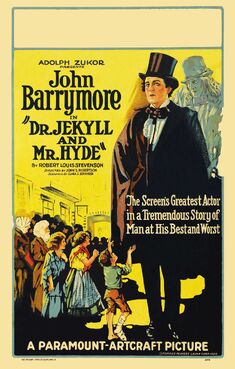
The 1920 horror film Dr. Jekyll and Mr. Hyde is a silent film adaptation of Robert Louis Stevenson's 1886 novel The Strange Case of Dr. Jekyll and Mr Hyde. The film was produced by Adolph Zukor and Jesse L. Lasky, directed by John Robertson, written by Thomas Sullivan and Clara Beranger; it was distributed by Paramount Pictures. The film follows closely with the popular play production of the narrative starring Richard Mansfield. Like Mansfield, the initial transformation of Jekyll into Hyde is performed by John Barrymore without makeup, relying upon facial contortion--though Barrymore does sport prosthetics as Hyde. The film is in the public domain and parts of it have been used in other series and movies (as observed by characters), documentaries, and music videos.
Summary[]
The film retains the major characters of Stevenson's novel, but is more in line with Thomas Sullivan's 1887 stage adaptation with its addition and attention to the character of Jekyll's fiance Millicent Carew as well as the repurposing of major characters. With the addition of Millicent, the film deviates from Stevenson's novel in that a domestic love story is interwoven within the narrative.
The narrative begins with Dr. Jekyll proclaiming to Dr. Lanyon that science has barely begun to realize its potential with regard to the human body and mind, to which Lanyon is entirely opposed, accusing Jekyll of meddling with the "supernatural." Unlike many other adaptations, the focus upon Dr. Jekyll's good works is amplified. In the beginning of the film, Jekyll is unable to attend a meeting with Millicent as he busied himself tending to the poor patients at a free clinic. We are explicitly told that Jekyll is a "progressive" and Lanyon, who admires him while disagreeing scientifically, is as much a "conservative."
The drama begins when Sir George Carew is suspicious of Dr. Jekyll's constant sacrifice of his time at the clinic and his seeming one-sidedness, claiming himself that man is not merely one, but two. When they have dinner together that evening, Sir Carew pushes the issue by challenging Dr. Jekyll's behavior: "When you get to be my age, what memories will you have?" Dr. Jekyll is made uncomfortable while Carew tells him of the perils of being constantly unyielding to temptation. Finally, Jekyll agrees to go with Carew and the other men to a club which features an exotic dancer. Carew pays a man to have the featured dancer come to Jekyll, and Jekyll, though at first clearly tempted, refuses her and leaves suddenly. This is the pivotal moment that brings Jekyll to endeavor to separate his selves. It is a clear deviation from the novel which made Jekyll at a lifelong battle with his duality. A text card reads explicitly that Jekyll had for the first time "wakened to a sense of his baser nature."
After completing his potion, which we don't see the process of experimentation for, Jekyll drinks the potion, transforms, and heads back down to the club. Here Hyde is acquainted with the dancer Jekyll refused. Her character is very flat and seems used only to mark Hyde's depravity and to provide Hyde with a poison ring (which Hyde steals from her). For a while Jekyll and Hyde live separately, but before too long Jekyll struggles to manage his time as Hyde and his need to be with Millicent. He stops taking the potion, but eventually Hyde reforms without it, and Jekyll is unable to see Millicent for days as he struggles to keep Hyde at bay.
Because of Jekyll's absence, Millicent cries to her father who then goes to question Jekyll. Hyde has just attacked a young boy and attempted to pay men off with Dr. Jekyll's cheques. Word of this gets to Carew before he meets Jekyll. Upon Carew's questioning, Jekyll becomes enraged with Carew, accusing Carew "you who first tempted me" and "you with your cynicism made me ashamed of my goodness." Jekyll transforms and kills Carew. The police search for him. And he finally kills himself after no more of a certain ingredient for his potion can be found and Millicent will soon be at risk of coming in contact with the violent Hyde.
Themes[]
Duality of Man[]
Like the original, duality of self is still played in the production. Obviously, Jekyll and Hyde are the gross embodiment. But we also see this theme discussed within the polarity portrayed between Jekyll and Lanyon, between the dancer Hyde uses and Millicent who Jekyll loves.
Sin as Stain[]
Jekyll embarks on his scientific endeavor to separate his selves and thereby allow his baser nature to do as it pleases while his immortal soul (which he assumes is separable from his nature) goes unstained of sin. The fact that Jekyll is damned by the end of the narrative indicates that despite the inherent goodness of some part of himself, his original intention in forming the potion was to ultimately let bad things occur in the world as a result of his lucid decision. As such Jekyll's initial moral failure can be paralleled to Macbeth's first murder: "If it were done when 'tis done, then 'twere well".
Significance[]
The film's explicitness in labeling Dr. Lanyon a conservative and Dr. Jekyll a progressive is significant to the era in which the film was produced. The film was produced towards the end of the progressive era, in which ideas of improving society, the environment, government projects, and some floating of the idea of eugenics were prime artistic subject matter. The film makes itself unclear of any political interpretation however: though Jekyll does become the villain by being overly idealistic, it is a "conservative" and wealthy Sir Carew who gives Jekyll the idea of having two selves, and initially tempts him.
Scenes of the production remain popular, having an appearance in HBO's Boardwalk Empire, Rob Zombie's music video of Dragula, Queen's music video Under Pressure, and in documentaries about silent film.
